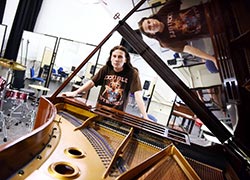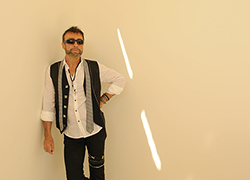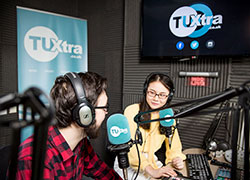Course overview
Foundation year Work placement
School of Arts & Creative Industries
See what it's like to study at our School of Arts & Creative Industries.
You are immersed in the world of music production, working on individual and group projects and compositions, and developing knowledge and skills which build towards your final portfolio. Explore composition, modern technology, creativity, production, collaboration with industry experts, live client projects, guest speakers, research activities and interdisciplinary working. Using our specialist technical resources, you learn how to create, produce, mix and master stereo and surround recordings in our recording studios. And you get to play instruments too – with electric guitars, acoustic and electronic drum kits, amplifiers, and other related sound equipment. You can also break out into making music podcasts.
You graduate with a broad range of experience, knowledge, understanding and skills appropriate to music production. You develop your unique creative voice and produce professional portfolios in both music and sound production in your individual specialism, enhancing your employability. You also get to showcase your skills and collaborate with students from other courses through interdisciplinary modules which replicate workplace environments. And you can get Adobe-accredited user status to enhance your employability prospects.
Top reasons to study music production at Teesside University:
- Specialist facilities: practice and learn in specialist spaces including sound studios, recording studios, post-production suites, audio patch bays, audio workstations and music technology lab.
- Regional opportunities: recent research has identified a cluster of recording, production and post-production studios in the North East region maintaining a presence in the national music and sound production landscape (Music Studio Market Assessment, Department for Digital, Culture, Media & Sport, June 2021).
- Expert teaching: our experienced tutors are professionals in music production, so you benefit from their industry expertise and technical know-how. 97.6% of design studies students agreed that staff were good at explaining things. (National Student Survey 2024, tees.ac.uk/source)
- Get creative: our course and campus are powered by Adobe and Apple. We’re Europe’s first Adobe Creative Campus as well as being an Apple Distinguished School for 2024-2027, the only university in the UK to hold this honour. These awards are in recognition of Teesside’s innovation, education excellence and leadership, and mean you benefits from the latest the digital tools and technology, allowing you to hone your creative music production skills.
- Work-ready: the course includes short, career-focused modules helping you understand working in the creative industries. Examine how the music production industry works, how to access it, who shapes it and how to grow within it. From industry leaders’ professional wisdom and insight, to accessing professional opportunities and creative coaching, you become an industry inside leaving with a working understanding of the professional community and a network of contacts .
Creative UK
 Take advantage of our Creative UK membership and help futureproof your career, with networking events, a resource hub to support professional development, and bespoke workshops in partnership with industry leaders and mentors. Sign up for free student membership to get opportunities, events and newsletters sent directly to your inbox.
Take advantage of our Creative UK membership and help futureproof your career, with networking events, a resource hub to support professional development, and bespoke workshops in partnership with industry leaders and mentors. Sign up for free student membership to get opportunities, events and newsletters sent directly to your inbox.
Course details
Course structure
Year 1 core modules
Enhance your skills in team-working, communication, project management and negotiation. You collaborate with a group of your course mates to produce a small-scale creative project in response to a subject-specific brief.
This is a 20-credit module.
Introduction to Music Production
Develop the fundamental knowledge and skills of music production practice. You learn the theories and practice of how to safely operate relevant music production hardware and software.
This is a 40-credit module.
Introduction to the Creative Industries
With many opportunities in the creative industries sector, learn how to start on your career path while developing vital employability skills such as networking and digital presence. Understand the structure of the sector and the interdisciplinary relationships between art, design and media. Discover how the sector operates locally, nationally and globally – debating the role of policy and the importance of sustainability.
This is a 20-credit module.
Explore a range of music production techniques through the study and creation of music production(s).
This is a 40-credit module.
Year 2 core modules
Develop critical thinking and analysis skills, exploring contemporary issues and debates related to the creative industries. You research a specific area or development within your chosen subject – this may be technical, economic, ethical, legal, cultural, sociological, or a combination. You draw on appropriate academic and industry sources to contextualise your research. You present your topic and initial research within taught sessions, providing an opportunity for peer and tutor feedback.
This is a 20-credit module.
You develop and explore, in depth, a creative industry-based project in your specialist area of design, art, media, music, photography or illustration - relevant to your future professional practice. While forming a professional portfolio of work, you experience real-world business scenarios and challenges, industry competitions and cross and inter-disciplinary activities. You gain skills in project management, applied research methods and collaborative creative work.
This is a 40-credit module.
Further develop your knowledge and skills in music production. Explore the multiple practices of music production by creating a body of audio and written work.
This is a 40-credit module.
Working in the Creative Industries
There are many challenges facing contemporary art, design and media practices. You research the social, political or ecological challenges around us to generate a small-scale project. You develop and reflect on your understanding of enterprise in the context of the creative industries. Contextualise your own professional practice and aspirations through application of critical thinking and problem-solving skills.
This is a 20-credit module.
Optional work placement year
You have the option to spend one year in industry learning and developing your skills. We encourage and support you with applying for a placement, job hunting and networking.
You gain experience favoured by graduate recruiters and develop your technical skillset. You also obtain the transferable skills required in any professional environment, including communication, negotiation, teamwork, leadership, organisation, confidence, self-reliance, problem-solving, being able to work under pressure, and commercial awareness.
Many employers view a placement as a year-long interview, therefore placements are increasingly becoming an essential part of an organisation's pre-selection strategy in their graduate recruitment process. Benefits include:
· improved job prospects
· enhanced employment skills and improved career progression opportunities
· a higher starting salary than your full-time counterparts
· a better degree classification
· a richer CV
· a year's salary before completing your degree
· experience of workplace culture
· the opportunity to design and base your final-year project within a working environment.
If you are unable to secure a work placement with an employer, then you simply continue on a course without the work placement.
Final-year core modules
You produce a self-managed, individual extended piece of independent investigation and/or creative production or portfolio of work. Supervised by an academic member of staff, you take responsibility for the planning and execution of the work, including the consideration of associated legal, social, ethical and professional issues. You explore in depth a chosen subject area, demonstrating your ability to analyse, synthesise and creatively apply your learning, showing critical and evaluative skills and professional awareness.
This is a 60-credit module.
Plan and implement your departure from education to your first or new career, or to further study. You continue your creative practice, developing a portfolio and/or extended piece of work which reflects you as a creative. You explore discipline-specific employability strategies, and engage and network with industry to develop key connections.
This is a 60-credit module.
Modules offered may vary.
How you learn
Think, dream and make: learn through doing, with focused studio time for practice-based creative work, allowing you to develop ideas and undertake larger-scale, more ambitious projects.
Develop your creative voice: you are coached to find and grow your creative voice. Collaboration with industry professionals and your peers gives you new perspectives on developing your practice.
Grow resilience: develop a creative journal, capturing your challenges, milestones and reflections to see patterns in your thinking and linking reoccurring ideas. You learn how to test ideas, explore creative directions, understand pitching etiquette and develop large-scale projects to help you thrive in the creative industries.
Join the creative sector: our intensive, career-focused modules help you understand working in the arts and creative industries. From industry leaders’ professional wisdom and insight to accessing professional opportunities and creative coaching, you become an industry insider and leave with a working understanding of the professional community.
Become connected: access our network of alumni and practising creatives at Middlesbrough Institute of Modern Art (MIMA). Benefit from supportive voices, specialist expertise, shared wisdom and new ideas, establishing critical relationships that propel you into your creative career.
Get creative: take part in MIMA Creative Week, a festival of workshops where you experiment with new materials, participate in field trips and upgrade your tech skills.
Expand your horizons: collaborate with our international partners in Prague, Dubai and India becoming international creative citizens while developing an understanding of wider global contexts, sustainability and the changing shape of equality and diversity.
How you are assessed
Modules are assessed by in-course assessment of a range of music-related media, written assignments and reports, individual and group presentations and live performances.
Professional placement
Study this course with an optional work placement year, at no extra cost. Alongside this, you can gain valuable experience and engagement with the sector through our shorter work placements, internships and work experience opportunities.Work placements
Our Disability Services team provide an inclusive and empowering learning environment and have specialist staff to support disabled students access any additional tailored resources needed. If you have a specific learning difficulty, mental health condition, autism, sensory impairment, chronic health condition or any other disability please contact a Disability Services as early as possible.
Find out more about our disability services
Find out more about financial support
Find out more about our course related costs
Entry requirements
Entry requirements
96-112 tariff points including any Level 3 STEM or music-related subject (32p/C or above)
Consideration is also given to students without formal qualifications but with evidence of practical music technology experience at an appropriate level. Applicants may be invited to share a portfolio where applicable to show skills in music production.
Applicants are invited join us on campus for an applicant day, enabling you to see our music technology facilities, gain valuable feedback on your portfolio from our music production academics, meet staff and students and learn more about studying at Teesside University.
English language and maths requirement
Normally GCSE English language and maths at grade C, or 4 under the new grading system. Alternative equivalent qualifications may be considered.
Non-EU international students who need a student visa to study in the UK should check our web pages on UKVI-compliant English language requirements. The University also provides pre-sessional English language courses to help you meet the English language requirements.
Helping you meet the entry requirements
We may be able to help you meet the requirements for admission by offering you the opportunity to study one or more Summer University modules, some of which can be studied by distance learning.
Alternative degree with integrated foundation year
If you are unable to achieve the minimum admission requirements for Year 1 entry you could, subject to eligibility, join one of our degree courses with an integrated foundation year.
Direct entry to later years
If you have previously studied at higher education level (for example, a foundation degree, HNC, HND or one or more years at degree level at another institution) you may request direct entry to Year 2 or year 3 of this degree.
Mature applicants
We welcome applications from mature students (aged over 21) who can demonstrate, through portfolio/written work and relevant experience, that they have developed cognitive and technical skills through their life experiences.
For general information please see our overview of entry requirements
International applicants can find out what qualifications they need by visiting Your Country
For general information please see our overview of entry requirements.
International applicants can find out what qualifications they need by visiting Your Country.
You can gain considerable knowledge from work, volunteering and life. Under recognition of prior learning (RPL) you may be awarded credit for this which can be credited towards the course you want to study.
Find out more about RPL
Employability
Career opportunities
Our students follow careers in sound and music production, sound capture (sound engineering), live sound production and engineering (gigs, theatre, events), sound design, processing and control, music for time-based media (film, video), broadcast (radio, television, internet), recording artists, music technology journalism and multimedia authoring.
Information for international applicants
Qualifications
International applicants - find out what qualifications you need by selecting your country below.
Select your country:
Useful information
Visit our international pages for useful information for non-UK students and applicants.

 BA (Hons) Music Production
BA (Hons) Music Production  BA (Hons) Music Production
BA (Hons) Music Production Teesside University student kickstarts music career
Teesside University student kickstarts music career Rock legend launches music scholarship at Teesside University
Rock legend launches music scholarship at Teesside University National recognition for digital platform showcasing student work
National recognition for digital platform showcasing student work 